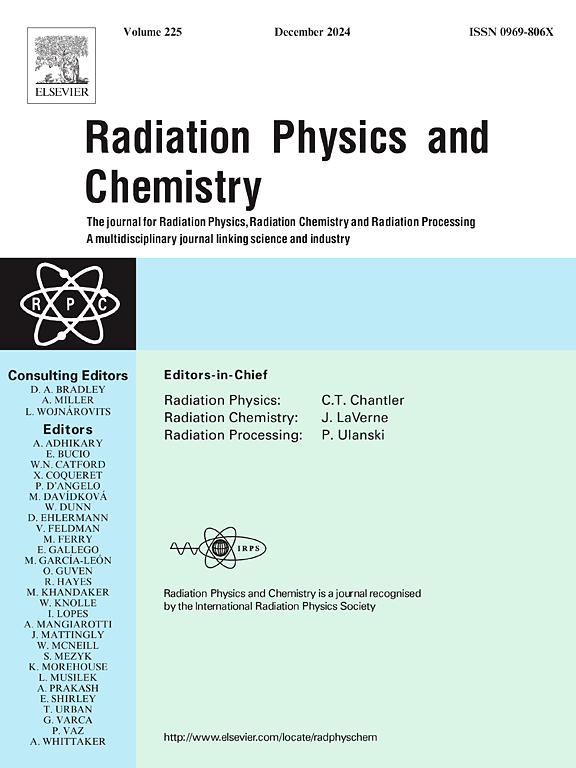The effect of high-energy electron beam irradiation on the physicochemical properties of PET material
IF 2.8
3区 物理与天体物理
Q3 CHEMISTRY, PHYSICAL
引用次数: 0
Abstract
Polyethylene terephthalate (PET) is a thermoplastic polyester used in the manufacture of containers and packaging. PET waste occupies one of the top positions in terms of volume among polymer waste. The radiation modification of PET is a promising method for regulating its operational and technological properties. It is assumed that irradiation of PET waste with an electron beam will facilitate its secondary processing. The aim of this work was to study the effect of the ionizing radiation on the PET physicochemical and physicomechanical properties. For this purpose, samples were irradiated by hig-energy electron beam with energy 10 MeV and dose range 0–600 kGy. The radiation-induced EPR of the signal was measured, and the dose dependence was estimated. As a result, it was found that irradiation with electrons leads to a decrease in the melting temperature and an increase in the melt fluidity and glass transition temperature of PET. The hardness and rigidity of the irradiated samples increase. The changes in properties are explained by the destruction of PET macromolecules, which proceeds with the formation of carboxyl and carbonyl groups.
高能电子束辐照对 PET 材料理化性质的影响
聚对苯二甲酸乙二醇酯(PET)是一种热塑性聚酯,用于制造容器和包装。在聚合物废物中,PET 废物的数量位居前列。对 PET 进行辐照改性是调节其操作和技术特性的一种可行方法。用电子束辐照 PET 废料可以促进其二次加工。这项工作的目的是研究电离辐射对 PET 物理化学和物理机械性能的影响。为此,使用能量为 10 MeV、剂量范围为 0-600 kGy 的高能电子束对样品进行了辐照。测量了辐射诱导的 EPR 信号,并估算了剂量依赖性。结果发现,电子辐照导致 PET 的熔化温度降低,熔体流动性和玻璃化转变温度升高。辐照样品的硬度和刚度增加。这些性质变化的原因是 PET 大分子遭到破坏,形成了羧基和羰基。
本文章由计算机程序翻译,如有差异,请以英文原文为准。
求助全文
约1分钟内获得全文
求助全文
来源期刊

Radiation Physics and Chemistry
化学-核科学技术
CiteScore
5.60
自引率
17.20%
发文量
574
审稿时长
12 weeks
期刊介绍:
Radiation Physics and Chemistry is a multidisciplinary journal that provides a medium for publication of substantial and original papers, reviews, and short communications which focus on research and developments involving ionizing radiation in radiation physics, radiation chemistry and radiation processing.
The journal aims to publish papers with significance to an international audience, containing substantial novelty and scientific impact. The Editors reserve the rights to reject, with or without external review, papers that do not meet these criteria. This could include papers that are very similar to previous publications, only with changed target substrates, employed materials, analyzed sites and experimental methods, report results without presenting new insights and/or hypothesis testing, or do not focus on the radiation effects.
 求助内容:
求助内容: 应助结果提醒方式:
应助结果提醒方式:


